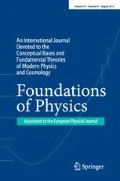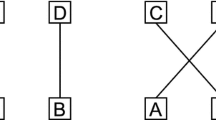Abstract
The purpose of the present paper is to consider the traditional interpretive problems of quantum mechanics from the viewpoint of a modal ontology of properties. In particular, we will try to delineate a quantum ontology that (i) is modal, because describes the structure of the realm of possibility, and (ii) lacks the ontological category of individual. The final goal is to supply an adequate account of quantum non-individuality on the basis of this ontology.
Similar content being viewed by others
Notes
Although van Fraassen does not endorse scientific realism (from his “constructive empiricism”, the aim of science is only empirical adequacy), he admits that a meaningful account of reality is necessary for a scientific theory to be intelligible.
According to the algebraic formalism of quantum mechanics, given a *-algebra \(\mathcal {A}\) of operators, (i) the set of the self-adjoint elements of \( \mathcal {A}\) is the space \(\mathcal {O}\), whose elements represent observables, \(O\in \mathcal {O}\) , and (ii) states are represented by functionals on \(\mathcal {O}\), that is, by elements of the dual space \( \mathcal {O}^{\prime }\), \(\rho \in \mathcal {O}^{\prime }\). In the case of a C*-algebra of operators, it can be represented by a Hilbert space \(\mathcal {H }\) (GNS theorem) and \(\mathcal {O}=\mathcal {O}^{\prime }\); therefore, both \( \mathcal {O}\) and \(\mathcal {O}^{\prime }\) are represented by \(\mathcal { H\otimes H}\).
Mathematically, a quantum system \(\mathcal {S}^{1}\) is represented by the set of operators \(\mathcal {O}^{1}\), or by the Hilbert space \(\mathcal {H}^{1}\) if \(\mathcal {O}^{1}=\mathcal {H}^{1}\otimes \mathcal {H}^{1}\).
In the case of working with C*-algebras of operators, \(\mathcal {O}^{1}\) and \( \mathcal {O}^{2}\) are represented by \(\mathcal {H}^{1}\otimes \) \(\mathcal {H} ^{1}\) and \(\mathcal {H}^{2}\otimes \) \(\mathcal {H}^{2}\) respectively. Therefore, \(\mathcal {O}^{c}=\mathcal {O}^{1}\otimes \mathcal {O}^{2}=\mathcal {H }^{1}\otimes \) \(\mathcal {H}^{1}\otimes \) \(\mathcal {H}^{2}\otimes \) \(\mathcal { H}^{2}\).
References
Lombardi, O., Castagnino, M.: A modal-Hamiltonian interpretation of quantum mechanics. Stud. Hist. Philos. Mod. Phys. 39, 380–443 (2008)
Lombardi, O., Castagnino, M., Ardenghi, J.S.: The modal-Hamiltonian interpretation and the Galilean covariance of quantum mechanics. Stud. Hist. Philos. Mod. Phys. 41, 93–103 (2010)
Ardenghi, J.S., Lombardi, O.: The modal-Hamiltonian interpretation of quantum mechanics as a kind of ‘atomic’ interpretation. Phys. Res. Int. 2011, 379–604 (2011)
da Costa, N., Lombardi, O., Lastiri, M.: A modal ontology of properties for quantum mechanics. Synthese 190, 3671–3693 (2013)
Dieks, D., Vermaas, P. (eds.): The Modal Interpretation of Quantum Mechanics. Kluwer Academic Publishers, Dordrecht (1998)
Lombardi, O., Dieks, D.: Modal interpretations of quantum mechanics. In: Zalta, E.N. (ed.) The Stanford Encyclopedia of Philosophy (Fall 2012 Edition). http://plato.stanford.edu (2012)
van Fraassen, B.C.: A formal approach to the philosophy of science. In: Colodny, R. (ed.) Paradigms and Paradoxes: The Philosophical Challenge of the Quantum Domain, pp. 303–366. University of Pittsburgh Press, Pittsburgh (1972)
van Fraassen, B.C.: The Einstein–Podolsky–Rosen paradox. Synthese 29, 291–309 (1974)
Kochen, S., Specker, E.: The problem of hidden variables in quantum mechanics. J. Math. Mech. 17, 59–87 (1967)
Suárez, M.: Quantum selections, propensities and the problem of measurement. Br. J. Philos. Sci. 55, 219–255 (2004)
Suárez, M. (ed.): Probabilities, Causes, and Propensities in Physics (Synthese Library). Springer, Dordrecht (2011)
Teller, P.: Quantum mechanics and haecceities. In: Castellani, E. (ed.) Interpreting Bodies: Classical and Quantum Objects in Modern Physics, pp. 114–141. Princeton University Press, Princeton (1998)
Maudlin, T.: Part and whole in quantum mechanics. In: Castellani, E. (ed.) Interpreting Bodies: Classical and Quantum Objects in Modern Physics, pp. 46–60. Princeton University Press, Princeton (1998)
French, S., Krause, D.: Identity in Physics: A Historical, Philosophical and Formal Analysis. Oxford University Press, Oxford (2006)
van Cleve, J.: Three versions of the bundle theory. Philos. Stud. 47, 95–107 (1985)
Loux, M.: Metaphysics: A Contemporary Introduction. Routledge, London (1998)
Benacerraf, P.: What numbers could not be? Philos. Rev. 74, 47–73 (1965)
Shapiro, S.: Philosophy of Mathematics: Structure and Ontology. Oxford University Press, New York (1997)
Keränen, J.: The identity problem for realist structuralism. Philos. Math. 9, 308–330 (2001)
Narvaja, M., Córdoba, M., Lombardi, O.: Different domains, the same problems. In: Pintuck, S., Reynolds, C. (eds.) Philosophy of Science, pp. 67–87. Nova Science Publishers, New York (2012)
Sebastião e Silva, J.: Sugli automorfismi di un sistema matematico qualunque. Comment. Pontif. Acad. Sci. IX, 91–116 (1945)
Da Costa, N., Rodrigues, A.: Definability and invariance. Studia Logica 86, 1–30 (2007)
Krause, D., Coelho, A.M.N.: Identity, indiscernibility, and philosophical claims. Axiomathes 15, 191–210 (2005)
Saunders, S.: Physics and Leibniz’s principles. In: Brading, K., Castellani, E. (eds.) Symmetries in Physics: Philosophical Reflections, pp. 289–307. Cambridge University Press, Cambridge (2003)
Muller, F.A., Saunders, S.: Discerning fermions. Br. J. Philos. Sci. 59, 499–548 (2008)
Muller, F.A., Seevinck, M.: Discerning elementary particles. Philos. Sci. 76, 179–200 (2009)
Dieks, D., Versteegh, M.: Identical quantum particles and weak discernibility. Found. Phys. 38, 923–934 (2008)
Castagnino, M., Lombardi, O., Lara, L.: The global arrow of time as a geometrical property of the universe. Found. Phys. 33, 877–912 (2003)
Castagnino, M., Lombardi, O.: The global non-entropic arrow of time: from global geometrical asymmetry to local energy flow. Synthese 169, 1–25 (2009)
Dieks, D., Lubberdink, A.: How classical particles emerge from the quantum world. Found. Phys. 41, 1051–1064 (2011)
Da Costa, N., Krause, D.: Schrödinger logics. Studia Logica 53, 533–550 (1994)
Da Costa, N., Krause, D.: An intensional Schrödinger logic. Notre Dame J. Form. Logic 38, 179–194 (1997)
Da Costa, N., Krause, D.: Set-theoretical models for quantum systems. In: dalla Chiara, M.L., Giuntini, M.L., Laudisa, F. (eds.) Language, Quantum, Music, pp. 114–141. Kluwer, Dordrecht (1999)
Krause, D.: On a quasi-set theory. Notre Dame J. Form. Logic 33, 402–411 (1992)
da Costa, N., French, S., Krause, D.: The Schrödinger problem. In: Bitbol, M., Darrigol, O. (eds.) Erwin Schrödinger: Philosophy and the Birth of Quantum Mechanics, pp. 445–460. Editions Frontiè res, Paris (1992)
dalla Chiara, M.L., Toraldo di Francia, G.: Individuals, kinds and names in physics. In: Corsi, G., dalla Chiara, M.L., Ghirardi, G.C. (eds.) Bridging the Gap: Philosophy, Mathematics and Physics, pp. 261–283. Kluwer, Dordrecht (1993)
dalla Chiara, M.L., Toraldo di Francia, G.: Identity questions from quantum theory. In: Gavroglu, K., Stachel, J., Wartofski, M.W. (eds.) Physics, Philosophy and the Scientific Community, pp. 39–46. Kluwer, Dordrecht (1995)
Worrall, J.: Structural realism: the best of both worlds? Dialectica 43, 99–124 (1989)
Ladyman, J.: What is structural realism? Stud. Hist. Philos. Sci. 29, 409–424 (1998)
French, S., Ladyman, J.: Remodelling structural realism: quantum physics and the metaphysics of structure. Synthese 136, 31–56 (2003)
French, S.: Structure as a weapon of the realist. Proc. Aristot. Soc. 106, 167–185 (2006)
French, S., Ladyman, J.: In defence of ontic structural realism. In: Bokulich, A., Bokulich, P. (eds.) Scientific Structuralism. Boston Studies in the Philosophy and History of Science, pp. 25–42. Springer, Dordrecht (2011)
French, S., Ladyman, J.: The dissolution of objects: a reply to Cao. Synthese 136, 73–77 (2003)
Acknowledgments
The authors want to thank Décio Krause for his organization of the Workshop “Logical Quantum Structures” in the context of the 4th World Congress and School on Universal Logic, and also the attendants to the workshop for their constructive comments to the oral version of this work. This paper was partially supported by grants of the Buenos Aires University (UBA), the National Research Council (CONICET) and the National Research Agency (FONCYT) of Argentina.
Author information
Authors and Affiliations
Corresponding author
Rights and permissions
About this article
Cite this article
da Costa, N., Lombardi, O. Quantum Mechanics: Ontology Without Individuals. Found Phys 44, 1246–1257 (2014). https://doi.org/10.1007/s10701-014-9793-1
Received:
Accepted:
Published:
Issue Date:
DOI: https://doi.org/10.1007/s10701-014-9793-1



